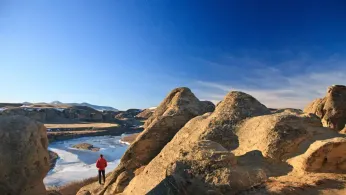
4 hours ago
Alberta’s Badlands: Canada’s Emerging Queer Haven Off the Mainstream Map
READ TIME: 3 MIN.
For decades, LGBTQ+ travelers in North America have flocked to iconic destinations like Toronto, Vancouver, and Montreal, where rainbow crosswalks and bustling Pride festivals are part of the cityscape. Yet, as queer adventurers seek alternative experiences beyond big-city borders, Alberta’s Badlands—stretching from Drumheller to Dinosaur Provincial Park—are drawing attention as a uniquely inclusive, off-the-beaten-path destination .
Historically, rural Alberta has been seen as conservative territory, with limited visibility for LGBTQ+ communities. However, recent years have seen a wave of grassroots activism, local business initiatives, and public events that have transformed the region’s reputation. According to AAA Club Alliance, Alberta’s Badlands now feature queer-owned accommodations and cafes, with many local businesses proudly flying the Pride flag and participating in regional LGBTQ+ outreach programs . This shift reflects broader changes in Canadian society, where protection against discrimination based on sexual orientation and gender identity is enshrined in national law .
Queer travelers will find welcoming atmospheres in small towns like Drumheller, home to the world-famous Royal Tyrrell Museum and a growing network of LGBTQ+ allies. Boutique inns and B&Bs, some of which are queer-owned, serve as safe spaces and community hubs, offering information on local queer-friendly events and attractions .
Alberta’s Badlands are quickly gaining a reputation for inclusive events that celebrate diversity and foster connection across identities. In 2025, Drumheller hosted its second annual Badlands Pride, drawing visitors from across western Canada. The event featured drag performances, panel discussions on LGBTQ+ history in rural Canada, and a family-friendly parade through the dinosaur-themed downtown—a powerful symbol of visibility in a region once considered inhospitable to queer life .
Community organizations, sometimes in partnership with local museums and parks, offer year-round programming. For example, Dinosaur Provincial Park’s “Rainbow Fossils” tours mix paleontology with LGBTQ+ history, providing a unique, educational experience that welcomes all identities .
Canada’s robust legal protections for LGBTQ+ people—enshrined in the Charter of Rights and Freedoms—create a safer environment for queer travelers compared to many other destinations in North America . Alberta, once seen as a laggard in this area, has made significant progress in recent years. Conversion therapy is banned nationwide, and local authorities in the Badlands have publicly affirmed their commitment to inclusion and non-discrimination . Many local businesses participate in LGBTQ+ sensitivity training, and tourism offices provide resources for trans and nonbinary travelers, including information about gender-neutral restrooms and medical support in the region .
The Badlands aren’t just about rainbow flags—they offer a deep connection to nature and a chance to reflect on the ongoing journey toward equality. Hiking among hoodoos and fossil beds, queer travelers can experience the vastness and resilience of the land, drawing parallels to the strength and tenacity of LGBTQ+ communities in rural spaces. Local guides, some of whom identify as LGBTQ+, share stories of queer pioneers who made their homes in the region long before it was considered “safe” to do so, honoring the complex histories that shape Alberta’s present .
Travelers can access the Badlands via Calgary International Airport, with car rentals connecting visitors to Drumheller and Dinosaur Provincial Park within two hours. Pride events are typically held in June and July, but inclusive programming and queer-friendly accommodations are available year-round. It is recommended to book lodging in advance during peak festival months, as the region’s growing popularity among LGBTQ+ visitors has increased demand for queer-owned and allied establishments .
Travel advice for trans and nonbinary visitors is available through regional tourism offices and LGBTQ+ organizations, which can offer up-to-date information on health services, legal rights, and social support networks .
Alberta’s Badlands exemplify how rural destinations can move beyond tolerance to celebration of LGBTQ+ identities, making queer travelers feel seen, valued, and welcomed. As more communities embrace inclusivity, the Badlands stand as a testament to the transformative power of visibility, allyship, and pride—proving that the journey toward belonging is not limited to the world’s major cities .






